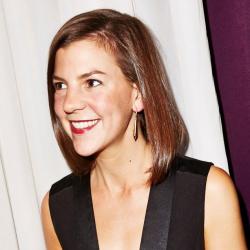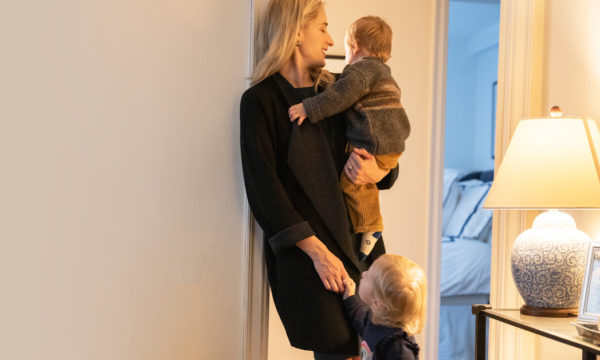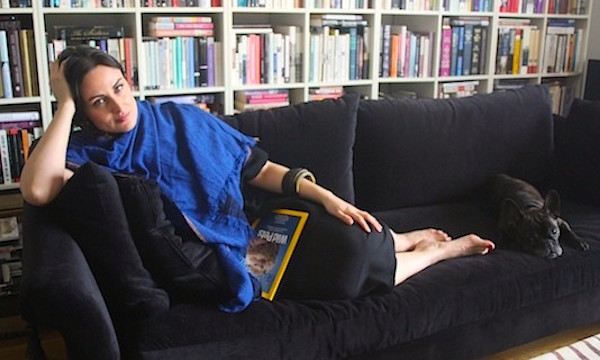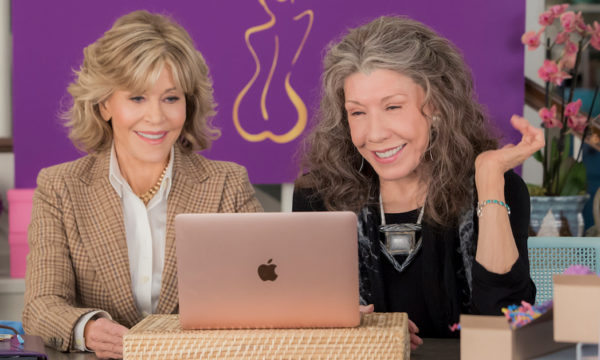Jordan Brooks on Working at the White House and Career Lessons from Michelle Obama
February 02, 2018 | Filed in: Woman of the Week
Now the COO and managing director of the United State of Women, Jordan Brooks started her career in politics at 22 as a volunteer for Obama’s 2008 campaign. From there, she got her foot in the door at the White House, where she worked her way up to deputy executive director of the White House Council on Women and Girls at the ripe old age of 27. Here, she talks about making the transition from assistant to boss.
I GREW UP IN A TINY TOWN in upstate New York. My mother is a very liberal Democrat and my father was a moderate to conservative Republican, and my parents always had lively conversations about their different viewpoints. They made sure I knew what was going on in the world, and they always brought me with them when they went to vote. I went to Notre Dame for college, which is a Catholic institution and a little on the conservative side. My political science classes were taught by professors with views all over the political spectrum. It helped me figure out why I believed what I believed in, because I was always being asked to question those ideas and understand many different opinions and points of view.
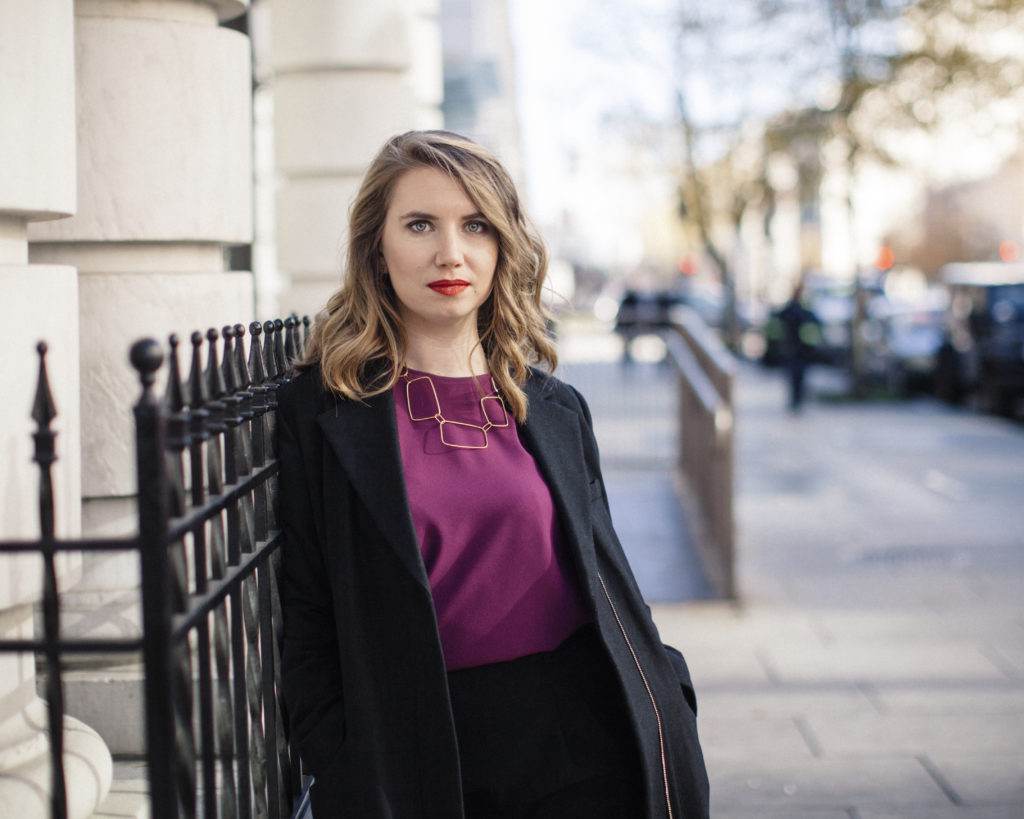
Jordan wears the Prospect Puffer in black, the Didion top in deep plum, the Nakamura trouser in black, and the Pandora necklace.
I’VE ALWAYS BEEN INTERESTED in women’s participation in politics. I majored in political science and gender studies, and I did my senior college thesis on quotas for women in government in sub-Saharan African. When I graduated in 2008, I wasn’t sure what I wanted to do, but I was inspired by then-Senator Obama’s message, and how he was uniting people around issues that I cared about. I did a little bit of volunteering on the campaign in Indiana, just knocking on doors. Then I heard about the Obama Fellowship Program. At the time, the campaign was taking on people who wanted to leave their jobs for six weeks, or were coming out of college, and training them in field organizing. I applied, was accepted, and a couple of weeks later, wound up in Hampton Groves, Virginia, for training with about 150 other fellows. My best friend today is a person I met on the first day of that program.
AFTER THE ELECTION, I volunteered to help with the inaugural committee, which was like another internship, and it led me to a job as a photo assistant in the Vice President’s correspondence office. The role involved photo editing and a little bit of communications work, and even though I didn’t have experience in that area, one of the staffers approached me about the position and asked if I was interested. By that point, they had gotten to know me and could see that I was capable of working hard and learning quickly. I was 22 and wanted very much to be a part of the administration, and I knew it was an opportunity to get my foot in the door.
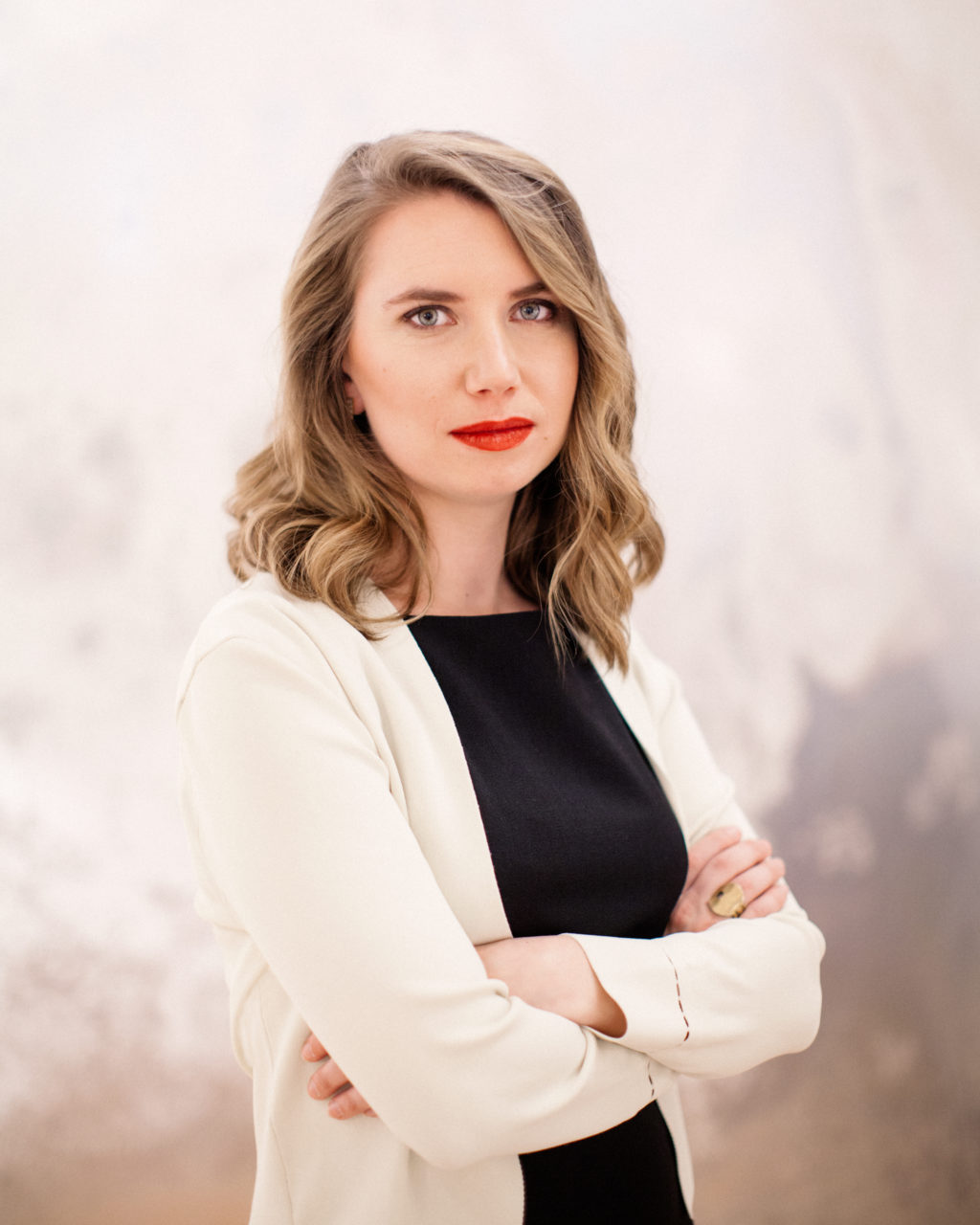
Jordan wears the Sant Ambroeus jardigan in ecru and the Ryann dress in jet twill.
WHEN THE OBAMA ADMINISTRATION appointed Lynn Rosenthal as the first-ever White House advisor on violence against women, I went up to her one day and said, “This is what I care about; can I help you? I have to do my regular job, but I also want to be as much a part of your team as I can.” Through the work I did for her, I met Tina Tchen, who was the assistant chief of staff at the time. Her special assistant was leaving, and I wound up working for Tina and moving over to the First Lady’s team for a few years. I organized Tina’s meetings and schedule, and helped with briefing materials on every issue you can think of. Tina was also the executive director of the White House Council on Women and Girls, which was the part of the administration that I had wanted to work in since my very first day.
MICHELLE OBAMA IS AN EXTRAORDINARY PERSON. Her whole team was gracious, kind, and thoughtful in everything they did. You were always expected to take the time and care to be knowledgeable about whatever issue you were focusing on, and making good arguments for what you thought was the right thing to do. Her office was also intent on making sure that you had a work/life balance. They would say, “Your family is important. Your friends are important.” If you had to leave early to go pick up your kids, that was okay.
AFTER TWO AND A HALF YEARS as Tina’s special assistant, I replaced one of the two staffers working on the White House Council on Women and Girls. Then the deputy director left, so I took over the day-to-day operations. It was my dream job, and it culminated in the United State of Women Summit in 2016. That was a defining moment. We brought 5,000 women together from organizations across the country to share their best practices from the work they did, so that others could replicate their progress. The summit was a joint effort with the United State of Women, and so it made sense to join their team after leaving the White House in early 2017. I’m now the managing director and chief operations officer there, and we continue to work on being a megaphone for the gender equality movement.
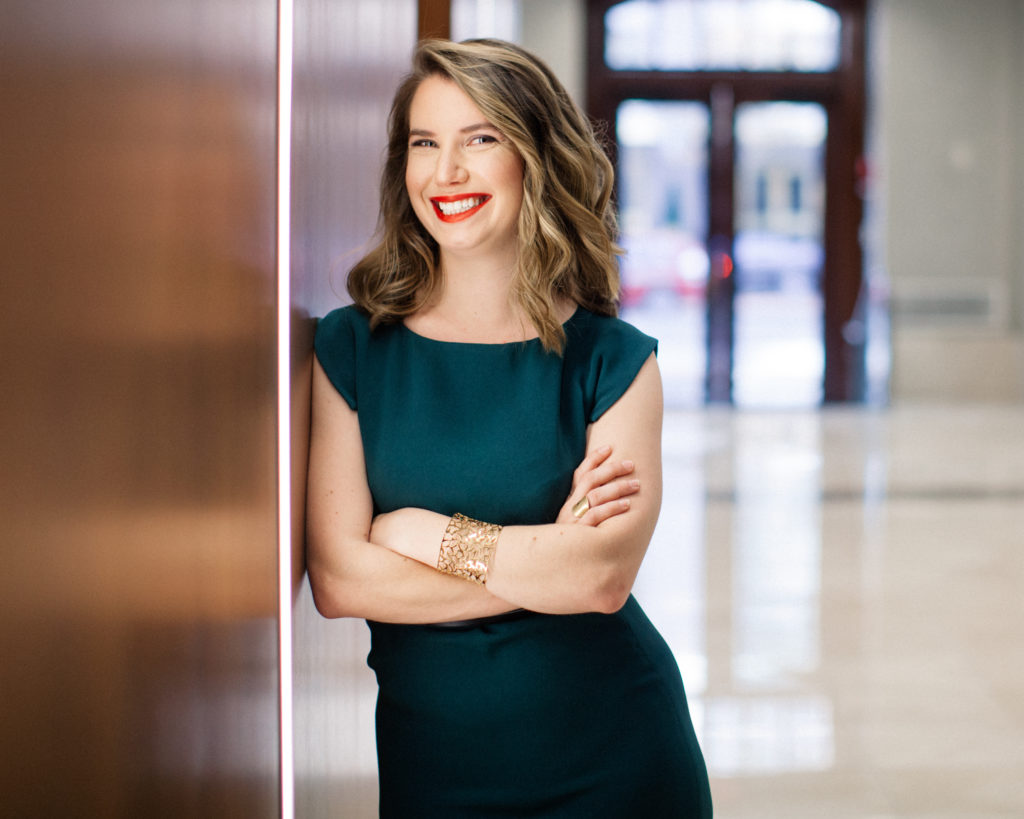
Jordan wears the Sarah dress in viridian and the Jupiter cuff.
MAKING THE TRANSITION from a supporting role to a leadership role was tough. When I was Tina’s special assistant, I was managing a lot of systems and schedules and materials, but I wasn’t directly managing people, so it was a hard shift. I had to go from very detail-oriented work to working on a broader scope of issues, like how to provide paid sick leave for the entire federal government. When you’re coordinating policy, that’s macro-level stuff, and I found it hard to delegate at first. But it helped to have team members who are far smarter than I will ever be, and so once I got to know them, I trusted them and learned to let go of some of the smaller tasks in favor of bigger, more strategic thinking.
IN THE WHITE HOUSE, everything is going a thousand miles a minute, so if you mess something up, you can’t dwell on it. You can cry in the bathroom or call a friend and say, “I’ve just done this ridiculous thing, and now I have to figure out how to fix it.” But you can’t let it hijack your day, because if you do, it will waste your precious time and other people’s. Obviously, you try to avoid mistakes as much as humanly possible, but you can’t let the perfect be the enemy of the good.
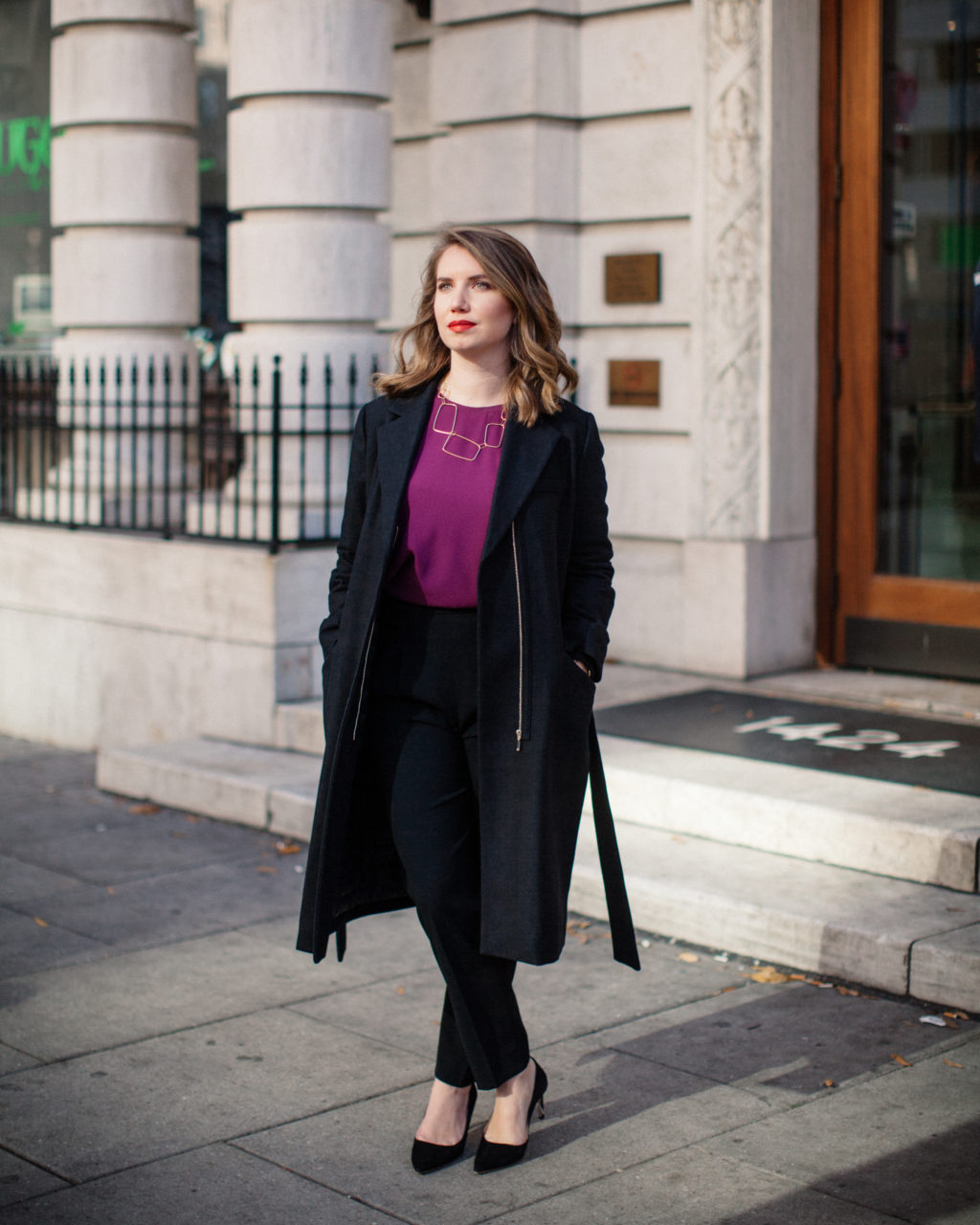
Jordan wears the Prospect Puffer in black, the Didion top in deep plum, the Nakamura trouser in black, the Vanessa pump in black, and the Pandora necklace.
THERE HAVE BEEN TIMES in my career when I felt a little lost. I spent almost eight years in the same building, and from time to time I would think, “Okay, maybe I should move on.” But then there was always a new project that I wanted to be involved in. Of course it was tiring, but then I’d think, “Should I go do something else just because I’m tired?” I never regretted staying.
I ALWAYS TRY TO REMEMBER that a career spans a whole lifetime, and so there will be ups and downs. A lot of my former government colleagues have also transitioned to the nonprofit world, and I’m excited about the work we’re doing. The United State of Women has trained over 2,000 women through our Galvanize program this year, and we’re seeing tremendous energy from women everywhere: from those who have been activists their whole lives, to those who hadn’t worked on anything political before but want to make sure that women and girls across the country are getting equal access to healthcare and education. It’s an exciting time.
Like Jordan’s winter-chic style? Shop winter-friendly workwear here.
Photographs by Rich Gilligan.






